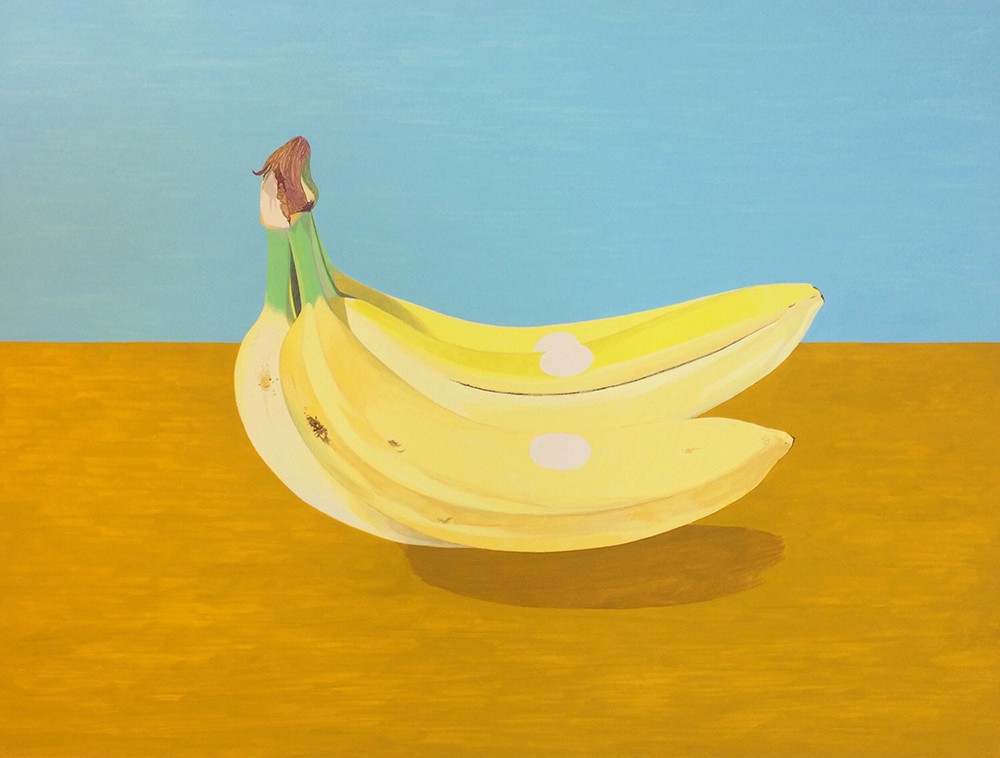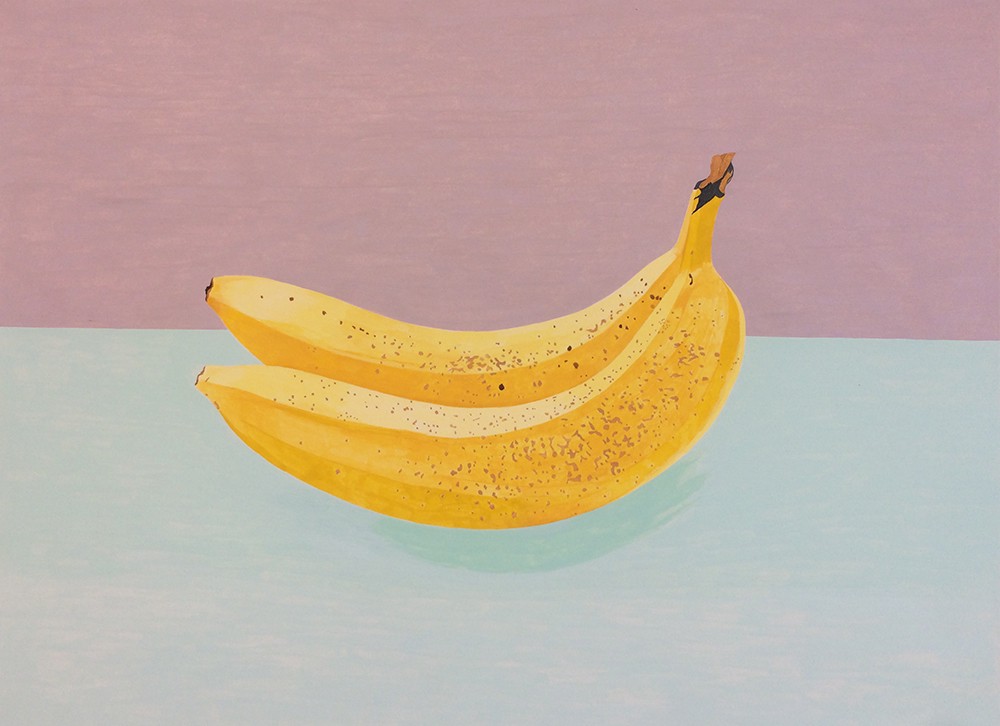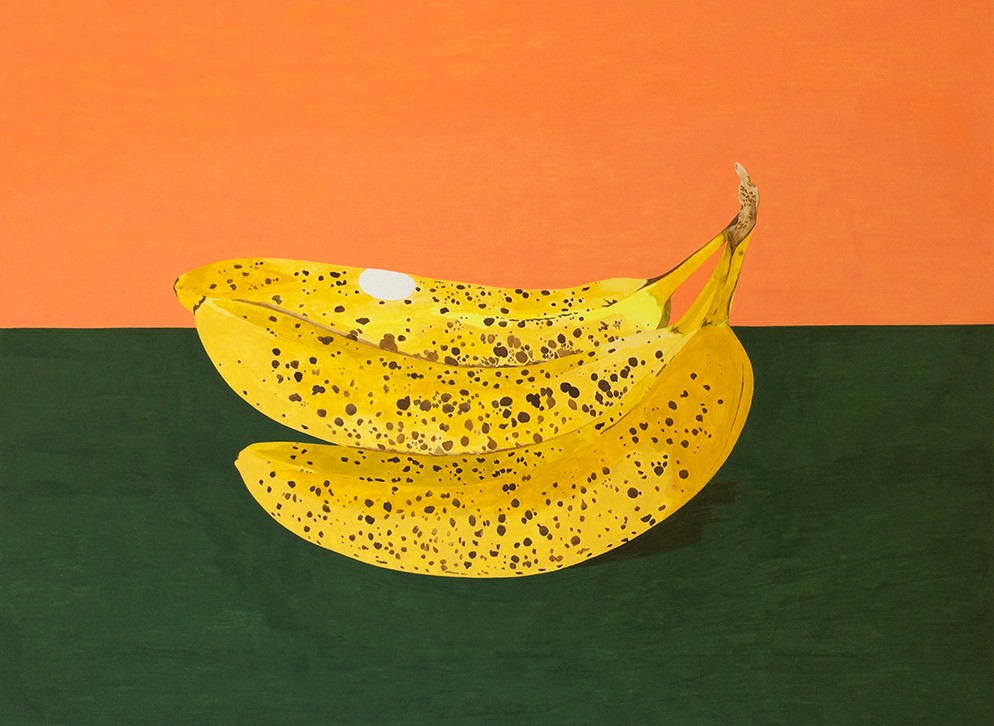We Have No Other Bananas
Buying, consuming, analyzing.

This morning’s banana was perfect, a solid shade of cheerful yellow, deep on the edges and along the lines, brighter in the flat planes. It was the right amount of ripe, not the not-quite-ripe with the tinge of green and the hairy mouthfeel, or the just too-ripe, an extra sweet and soft elixir. But wholly right and solid. I peeled it at the stem and opened it without a hitch. No effort was spent opening the banana, just a quick flick like I’ve done thousands of times. I am very good at opening bananas.
Of course, sometimes things go wrong and the physics of the banana is unexpected and the banana squirts while the flesh stays strong. I have at times opted for the violent but accurate banana snap by holding the banana with two hands, one on each end of the banana, taking a deep breath, and then making a quick jerk with my hands as if breaking a stick. If the banana is the right kind of ripe, it will split in two and your friend who is also hungry standing next to you will marvel at your savvy, your banana knowhow.
This morning I opened the banana at the stem, not really thinking at all. (I do not care for the blossom-end opening. I don’t care if the stem is a handle, I am not a monkey.) Like I said, it was a nice banana. I peeled it back about halfway and used a butter knife to cut it in half lengthwise first, and then into half-moon pieces. I did this for my child’s breakfast cereal, though it is a method I developed in my college dining hall and I remember someone remarking on my cute banana pieces. Perhaps I am the first to favor the half-moon piece over the full disk. I think banana pieces should be about the same size as the cereal pieces. It seems obvious to me.

I have eaten thousands of bananas in all circumstances — rest-stop bananas, airport bananas, 7–11 bananas, street bananas. The summer before my senior year of college I lived in New York in a sublet a few blocks from the Empire State Building. Once near my apartment I saw the woman who played Blanche on the Golden Girls. She was a vision crossing the road with her nose tilted up slightly and a scarf flapping softly as if she were Amelia Earhart crossing the Atlantic.
Each morning, I would walk to Broadway above Houston to work at a magazine that listed events and reviews and was snappy and hip. Somewhere along Lafayette Street I would stop at a cart and buy a banana and eat it as I walked. I did a lot of walking around for the magazine, posting flyers and straightening stacks and checking in on places. Sometimes the magazine would let me write book reviews and the thrill of seeing my name in print made me feel as if I were levitating, blood in my ears, voices cheering. When I interviewed for the job I wore a white t-shirt with the cardigan part of a melon-colored twinset from Ann Taylor. I did not know what a twinset was in those days. (Why would anyone wear two sweaters?) Now I understand better the East Coast ways, but I still will not wear two sweaters.

Did anyone ever eat a banana with a spoon? I imagine there was a whole industry of banana-spoon makers that never happened. There are grapefruit spoons, of course, with their tiny piranha teeth, but the banana spoon would not need sharp edges. It would probably need a good point though to dig out the flesh. Would you split the banana at a seam and open it up slightly and then squish the ends like a baked potato? Then you could use your spoon and that would be even less like a monkey. Especially if the banana were on a plate made for bananas. Like a kidney-shaped plate only in a banana shape.
Or would it be better to have a tiny fork and knife? Then you would not need to touch the banana and no one would accuse you of being a monkey because you would have two utensils, a special plate, and a twinset. If you were also wearing shorts and pants at the same time then it would be a double twinset, sitting at the table in your giant chair with a bell and a napkin. I have heard that the banana-utensil industry has tripled in the last year alone. The rest-stop bananas come in individual air-tight cases with a built in spoon system so you can eat on the road.

At the grocery store where I buy my bananas, there are choices to be made. Should I buy the organic or the regular? The organic are often green. The regular are nice and yellow. I try to buy whichever ones are the most yellow-green, the ones that will be ripe in a day or two. There are never brown bananas at the grocery store. Those are given to the monkeys or I imagine piled up in a large pyramid of brown bananas, with the ones at the bottom liquidizing under the weight of the newer bananas stacked on top. This giant banana pyramid is behind the meat counter through the door labeled employees only.
The other choice I must make is whether to stand in line for the human register or the robot one. They both have their appeal. The human register is satisfying because people have nice faces and some pleasantries and sometimes there’s a funny vibe between you and you can laugh together over something small. At my store there is a blind man who will bag your food for you. His hands move smoothly as they handle the food and place everything gently into green cloth bags. He likes to chat and has a rather alluring way about him.
The robot option I take only when I have a few items, like a bunch of bananas and a gallon of milk. The robot does not have a face or pleasantries but it does have a voice that I admire. It says: “Please move your … (pause) BANANAS to the moving belt.” The robot loves saying BANANAS in a loud, flat way very different from the other words.

Sometimes the marks and bruises on a banana look like words to me. They tell a story of life from tree to basket to box to truck to truck to boat to truck to truck to rest stop, to car cup holder on a long trip. I’m on my way across the George Washington bridge now and there is terrible traffic and I am stopped still. I will eat my banana.
I open the individual air pack with a flick and grab the small spoon. I always drop it but they have thought of everything and there is a spare spoon to share with a friend. The top of the banana is sliced off of course so I can dig right in with my long pointed spoon. I see the guy in the car next to me is also eating a banana and it’s a different brand of packaging but we all have our favorites. I bear no grudge against this other person, though now I think less of him.
The woman in the car on the other side of me is eating a banana with her hands. That banana must have cost a fortune! Those artisanal types. I bear no grudge against her but now I think less of myself. The traffic begins to move again and I put my banana package back into the cup holder. I’ve heard they are making cars with special banana holders so you can be hands free.

Now it is time to review. Do you: A) wear the twinset to the interview now that you know what it is, B) choose the human or robot checkout line, C) eat your banana like a monkey, D) look for truthful messages in the spots on your banana, E) all of the above?
Answer: I will eat the other half of this morning’s perfect banana that my child does not eat and I will toss the peel into a compost bucket made out of an empty milk gallon. I will say goodbye to the dog and go on my way to work where I will forget about this banana and the thousands of bananas before it. I may even have another banana before noon and it will be a little too ripe, because it is an office banana. I will open the banana at the stem and eat it with my hands because the banana utensil industry is a sham.
Later today, early this evening, I will go to the grocery store and not like the look of any of the bananas. I will throw open the door behind the meat counter and choose option F) jumping headlong onto the pyramid of bananas. I will try tossing the rotting flesh up with joy like autumn leaves. The bananas will fall heavily with a thud and the goo will be thick.The weight of my body, built up over the years by thousands of bananas, will turn everything below me into a syrupy puddle. My twinset is ruined. The puddle will leak out into the meat department and someone will call for a cleanup. People will suggest I make banana bread and perhaps I will, someday. I know you can’t swim in bananas forever. But for now I will claim this small kingdom and I will tread the banana elixir.
Amy Jean Porter is an artist who lives in Connecticut. She illustrated The Artists’ and Writers’ Cookbook: A Collection of Stories with Recipes edited by Natalie Eve Garrett (powerHouse Books, Fall 2016).
